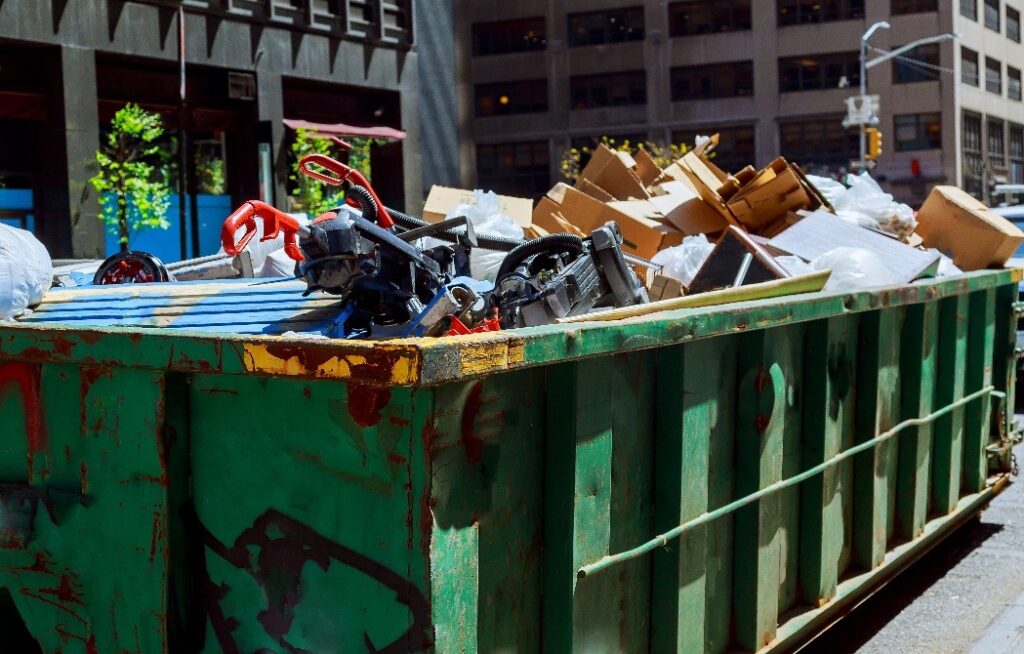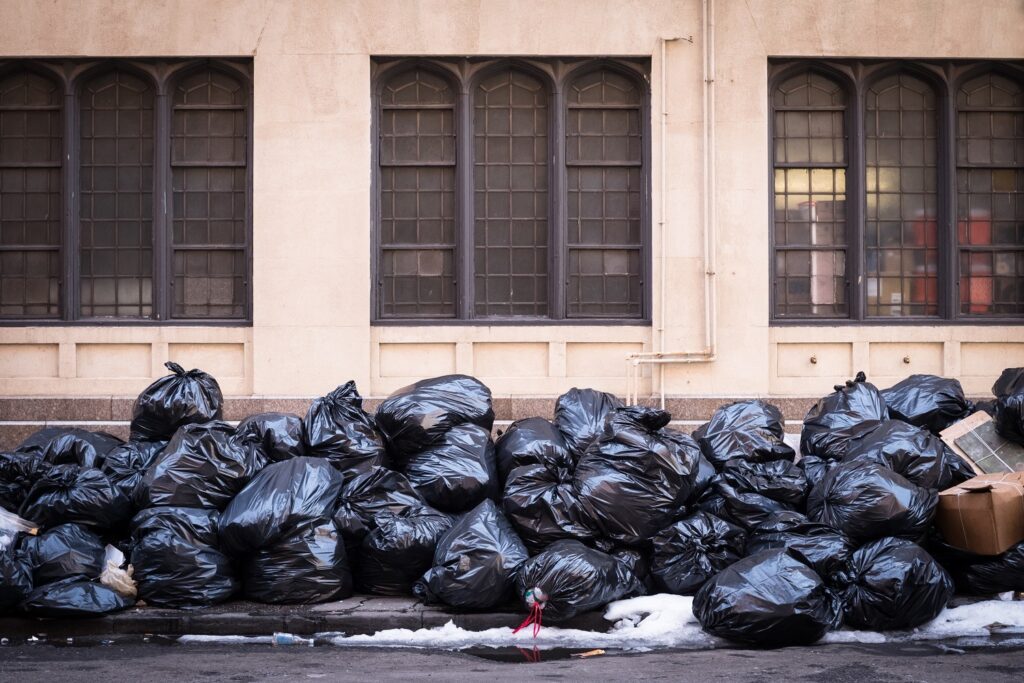CALL NOW FOR A FREE QUOTE 866.760.8194
Are NYC Commercial Waste Zones Raising Hauling Costs for Your Business?
On October 30th, 2019, the New York City Council passed the Commercial Waste Zones law, which requires designated carters or waste haulers for each of more than 20 different zones. In late November, this was signed into law by the NYC Mayor. Negotiating a commercial waste collection contract in this changing landscape is causing local businesses to review their waste management plan.
Let’s discuss the new challenges around waste removal in NYC, the pros and cons of these policy changes, and how your company can leverage resources like waste management consulting services to negotiate contracts which lower hauling costs.
How Does Commercial Waste Zoning Work in NYC?
New York’s Department of Sanitation (DSNY) is in the process of creating a competitive bid market, assigning private haulers to specific commercial districts throughout the city. Only a few carters will be approved for each zone, based on their plans to improve their operations in line with the goals of the DSNY.
These contracts will start in 2021, over a several-year transition period, with a goal to reduce the cross-city traffic from the more than 90 different trash hauling companies in NYC. These carters serve 100,000 commercial locations, currently crisscrossing routes and putting more trucks than necessary on the same streets for garbage pickup.1

The program seeks to accomplish these goals:
- Reduce garbage truck traffic by 50% or more
- Eliminate millions of heavy-duty truck miles on NYC streets
- Strengthen service standards across the board with established requirements
- Allow continued customer choice among the approved haulers in each zone
- Provide a regulatory framework and organized system for future initiatives
- Work toward Zero Waste goals and create incentives for recycling programs
- Reduce air pollution and improve quality of life for citizens
- Offer fair, competitive, transparent pricing for businesses and industry
- Improve safety standards within the state’s waste management industry
- Increase workplace safety and improve labor standards for workers in the industry
- Encourage investment by carriers in modern hauling fleets, equipment, and facilities
- Prevent monopolies or over-reliance on any one carrier within the city1
The Pros and Cons of Commercial Waste Zones in NYC
Of course, there are many concerns about a change of this magnitude in the waste management business here in New York City. Some of the concern’s customers raised about the plan include:
- Many private carters who are not chosen for designated zones or routes may face going out of business
- The limit of 3 approved haulers per zone will severely limit competition and may raise prices for commercial customers
- Reduced quality of service and limited options to change carriers if commercial customers are dissatisfied with their service
- Increased government bureaucracy and control of the free market by offering limited options from which businesses may choose
- Designated carriers will be selected based on their plans to meet the environmental goals of the city, rather than on customer preference or established relationships
- Displacing workers, many of which are low-income or vulnerable individuals, due to the number of local trash carters being reduced
Advocates of the plan point out several positive effects it may have:
- Reduction of waste buckets on the streets to those of a few carriers
- Safer streets for community members and pedestrians
- Less wear and tear on city streets from heavy truck traffic
- Reduction in emissions and less air pollution by having shorter, less redundant routes
- Improvements in recycling and composting rates by rewarding
- companies who improve their rates and penalizing those that do not
- Fleet modernization and better waste stream management for NYC as a whole
On Street Pickup Containers to Replace Piles of Trash Bags
New York City has a long and dirty tradition of putting piles of trash bags out for pickup on garbage day. This practice stems from the way the city was built, without back alleys between buildings. While there has been little choice for businesses and residents in the past, new initiatives by the Department of Sanitation require many buildings to set out sealed containers for garbage pickup.

Buildings and facilities which do not comply with this new rule will no longer be eligible for free trash pickup from the DSNY. While this decision is also causing some heated discussion, the intention of the requirement is to reduce food sources for rats and vermin as well as make pickup easier and more sanitary for workers and pedestrians.
Designated trash haulers would service these new pickup containers, raising questions about how this service will be contracted and paid for. Cleaning up the streets is a fantastic goal for public health and safety, but every such initiative comes at a price. Commercial businesses and facilities may wind up carrying additional costs to support these projects.
How Does Commercial Waste Zoning Impact Commercial Hauling Costs?
NYC businesses are encouraged by the Business Integrity Commission (BIC) to obtain price quotes from its list of licensed carters. This list ensures that only legally authorized waste haulers are available to choose from. Finding the best deal depends on additional factors which influence the cost of your commercial waste hauling, including variables like:

- Choosing to pay a flat fee for all waste removed, or a variable fee based on how much waste is produced by your business
- For variable fee contracts, commercial customers must choose whether to pay by weight, bag count, or volume of waste produced
- Businesses are responsible to have a waste stream survey performed to determine what types of garbage and recyclables they produce, and which method will be most cost effective for them
- Obtaining price quotes from several companies based on the results of the waste stream survey to determine if one carrier will provide better rates than another
- Being aware of any additional charges or fees which may not be included in a weight or volume quote, and can add up to additional costs which make one carter more expensive than another
- Contacting the BIC to determine if any new carters have been approved since the authorized list was last updated
- Prominently displaying a BIC decal provided by your chosen hauler to identify which carter is authorized to haul waste from your company
- Utilizing balers and compactors to reduce waste volume to further reduce hauling costs for NYC businesses
- Auditing the commercial waste management plan your company uses on a regular basis to implement improvements based on new technology or available programs
Choosing the Best Commercial Carter in Your NYC Commercial Waste Zone
Navigating this new environment requires experience and knowledge about the inside practices of the waste management business. Deciding to go by weight or bag count, which carter to choose, and whether the price quoted to your business is reasonable can be challenging with limited resources and time to spend on this complex problem. Many NYC businesses partner with waste management consulting services like ours to get the best price for the long term.
Global Trash Solutions (GTS) works with some of the most renowned businesses in NYC and Manhattan, including locations in Times Square, Union Square, and Herald Square. At GTS, we know from experience which carters to trust, and which to avoid. Please call us today at (866) 760-8194 for information about how GTS can help get your business the best price for trash and recycling service in New York City for 2021 and long into the future.
Sources:
Recent Post
Is Hiring a Waste Consultant Right for Your Business?
Managing waste and recycling needs poses a distinct hurdle for businesses focused on…
Read More >Understanding Scope 3 Emissions
Scope 3 emissions are an important component of a company’s total greenhouse gas…
Read More >